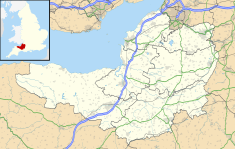The Wool Hall
| The Wool Hall | |
|---|---|
| Location | Beckington, Somerset, England |
| Coordinates | 51°15′44.3″N 2°17′15.5″W / 51.262306°N 2.287639°W |
| Built | 16th century |
Listed Building – Grade II | |
| Official name | The Wool Hall |
| Designated | 11 March 1968 |
| Reference no. | 266972 |
The Wool Hall was a residential recording studio in the village of Beckington, near Bath, Somerset, England.
History
The Wool Hall dates back to the 16th century, when Beckington was a centre of the wool trade in Somerset.[1] For a time, it was associated with the nearby Beckington Castle and by the 19th century, it was restored for use as a home and store.[2] In 1968, the hall became a grade II listed building and in the 1980s, it was converted into a recording studio by the pop group Tears for Fears, who used it to record their album Songs from the Big Chair. In 1986 the studio was opened for use by other artists.[3] Van Morrison bought the studio in 1994, having already recorded five albums there, and it served as one of his main recording studios for a large collection of analogue master tapes recorded during his decades-long musical career.[4][5] In August 2002, Morrison put the studio up for sale for just under a million pounds[6] and it became a private home and studio the following year.
Use as a recording studio
Many artists used The Wool Hall during its 20-year history as a recording studio.[7] The Smiths recorded Strangeways, Here We Come (their final album) there in 1987. According to Morrissey it was at the end of one of those sessions, in "a glut of meetings with accountants and lawyers at The Wool Hall Studio... [that] the Smiths breathed a last exhausted sigh and folded." [8] Morrissey also recorded his first solo album, Viva Hate at the studio shortly after; its title a reference to the tension of the earlier Smiths' sessions. Other artists who used the studio included Annie Lennox, Joni Mitchell (parts of Chalk Mark In A Rain Storm), Julia Neigel, The Pretenders (Last of the Independents), David Sylvian (Secrets of the Beehive, recorded in August 1986[9]), Sisters of Mercy (parts of Floodland), 808 State, Stereophonics, and Paul Weller. Music producer Denis Ingoldsby purchased Wool Hall in 2006, where he produced music,the studio was subsequently sold in 2016 into 3 residential living units.[10][11][12]
See also
References
- ^ "Beckington: Village History". Beckington Village Website. Retrieved 12 August 2015.
- ^ "The Wool Hall, Beckington". British Listed Buildings. Retrieved 10 August 2015.
- ^ Mills, Peter (2010). Hymns to the Silence: Inside the Words and Music of Van Morrison. A&C Black. p. 392. ISBN 978-0826429766.
- ^ "Wool Hall Studios - Now Closed". Record Production. Retrieved 9 August 2015.
- ^ Jopson, Nigel (1 October 2006). "Interview with Mick Glossop". Resolution. Retrieved 12 August 2015.
- ^ Elliott, John (25 August 2002). "Van Morrison - Moving On". The Times. No. Home Section. p. 3.
- ^ "Wool Hall Studios". Discogs. Retrieved 9 August 2015.
- ^ Morrissey (2013). Autobiography (EPUB ebook ed.). Penguin. p. 179. ISBN 978-0141394817.
- ^ "The Wool Hall Studio / Aug 1986". DavidSylvian.net. Retrieved 9 August 2015.
- ^ "The Wool Hall" (PDF). Pritchards. Retrieved 17 February 2019.
- ^ "Former Tears For Fears studio near Bath is being dismantled and sold piece by piece". Bath Chronicle. 25 February 2018. Retrieved 17 February 2019.
- ^ "Tears for Fears' former studio in Beckington fades out". Frome Times. Retrieved 17 February 2019.
External links
- The Wool Hall Residential Recording Studio – Official website as of 2003, archived via the Wayback Machine.
- The Wool Hall, Beckington, Somerset – Historic England's photographic record of The Wool Hall.

